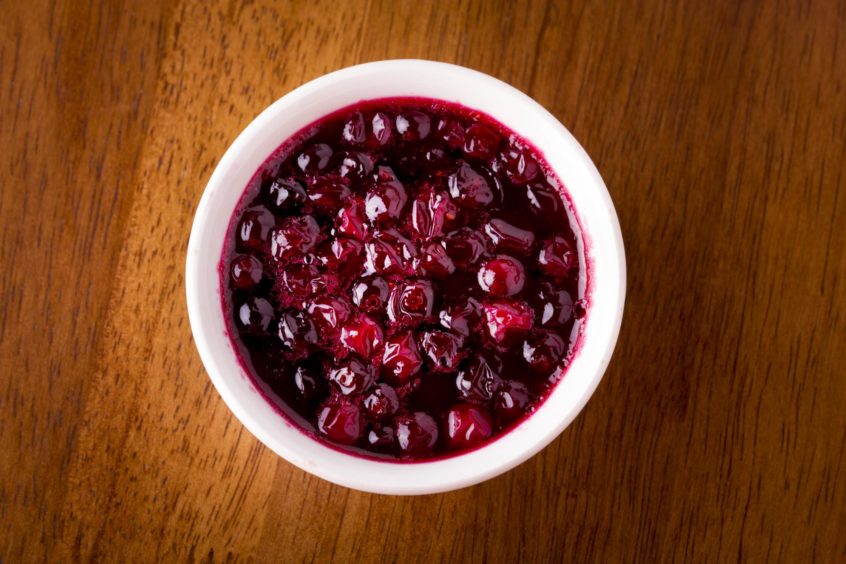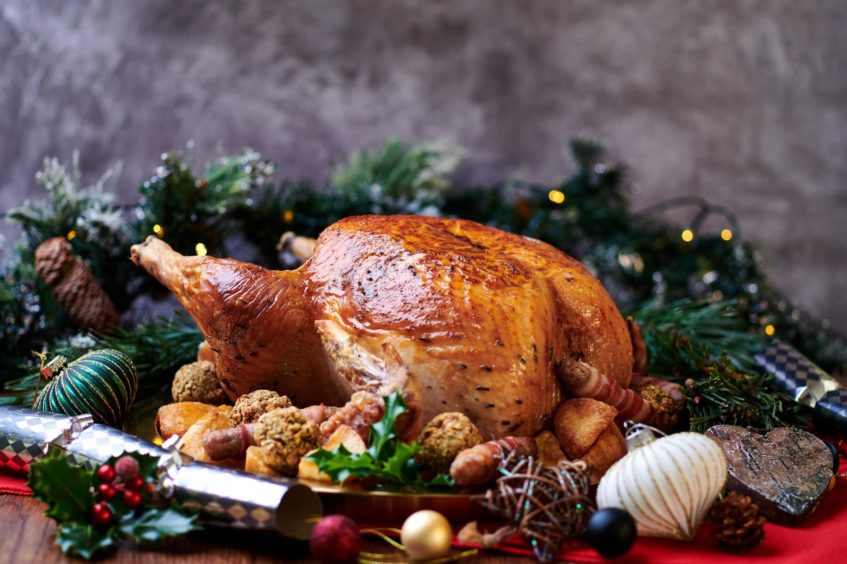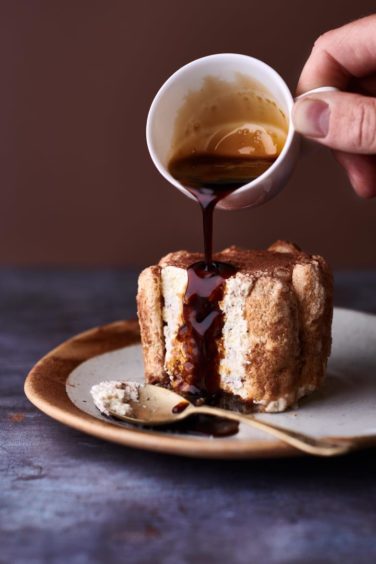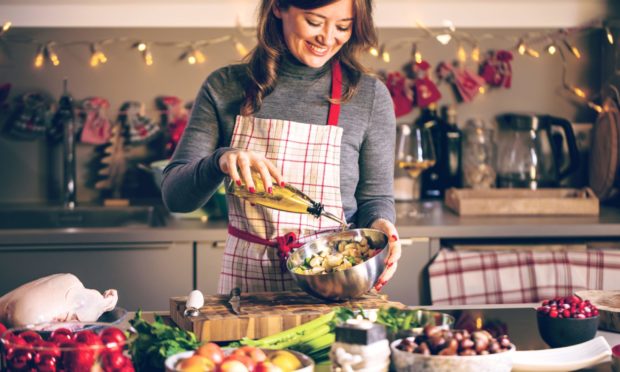If you have a gluten intolerance or you’re catering for someone else who does this Christmas, here are a few things to look out for as well as some recipes to help the day go smoothly.
Unlike vegetarian or veganism, where it’s often pretty obvious what has meat or animal products in it, being gluten free is slightly more hazardous as gluten (usually in the form of flour) can be added to the most unexpected foods, such as sauces and crisps.
Whether you’re catering for a gluten-free guest or you can’t eat it yourself, here are some top tips and recipes from Coeliac UK to help you pull off the day without a hitch.
1. Always check the label
Generally, anything containing wheat or barley will have gluten in it by default, as well as some oats (though not all).
Before serving anything, it’s always best to check the label as sometimes gluten can appear in the most unexpected places.
For instance, some vinegars distilled from barley aren’t gluten free and some crisps, despite being made from potatoes or corn, can be coated in a flour flavouring, which would make them inedible for anyone with a gluten allergy or intolerance. Don’t assume anything – always check!

2. Get to know your alternatives
If you’re feeling a little overwhelmed by the thought of checking that everything is suitable for a gluten-free diet, there are several resources out there to help.
For example, Coeliac UK has created this handy guide to alternative Christmas foods from all of the major supermarkets, including advent calendars, cakes, cranberry sauces, pigs in blankets, Christmas cakes and even gravy. So you can plan exactly what to get before you even leave the house, meaning there will be no more feeling overwhelmed in the aisles.
The charity has also made an award-winning app that allows you to scan food labels in the supermarket so you can check whether they are suitable. If you’re new or unfamiliar with gluten-free diets, this could help ease your mind while doing the food shop.
3. On the day
You’ve got your food and you’re ready to start cooking, but there are still a few more things to consider before you dive in. First, be sure to keep the gluten-free food separate from those that contain gluten, both when preparing it and when serving. Some gluten intolerances are so severe that even the slightest bit of contamination can set off a reaction, so it is best to avoid this as much as possible.
Make sure you use separate utensils and, if you’re putting food out, ensure it’s clear to everyone which food is gluten free and which isn’t.
Bear in mind that some drinks also contain gluten, though the vast majority don’t. Things like wine, sparkling wine, cider and most spirits are all gluten free, as well as mixers like tonic water, soda water and lemonade.
Recipes for success
If you’re wanting to make everything from scratch, rather than rely on pre-made meals, here are some easy Christmas recipe ideas for a side, a main and a dessert that are all gluten free. All of these recipes and more can be found on the Coeliac UK website.
Cranberry sauce
Serves 6

Ingredients
- 200g fresh or frozen cranberries
- 75g sugar
- 75ml orange juice
- 1 lemon, juiced
- ½ tsp cinnamon
Method
- Place all of the ingredients into a pan and bring to a gentle simmer, stirring occasionally. Cook for 5-10 minutes until the cranberries are soft.
- Transfer to a bowl and leave to cool. The mixture will thicken as it cools.
Tip: This can be made up to a week in advance and then saved in the fridge until needed.
Christmas turkey
Serves 12

Ingredients
- 1 whole turkey
- 1 onion
- A handful of rosemary
- A handful of thyme
- 1 bay leaf
- 1-2 garlic cloves
- Sea salt and freshly ground black pepper
Method
- Take the turkey out of the fridge and unwrap it at least an hour before cooking.
- Heat the oven to 200C Fan/220C/425F/Gas Mark 7.
- Place the bird in a roasting tin, breast-side up. Cut an onion into four to six pieces. Put some in the cavity with a few sprigs of rosemary, thyme and/or bay and a clove or two of garlic.
- Season the turkey with salt and pepper – be generous with the salt as it crisps up the skin. Then rub it in thoroughly. Put the rest of the onion and some rosemary around the bird. Flip the bird over so it is now breast-side down (the generous layer of fat on the back will drip down and baste the breast as it cooks). Do the salt and pepper rub again.
- Roast the turkey for 20-30 minutes until bronzed.
- Turn the oven down to 150C Fan/170C/325F/Gas Mark 3 and cook for three hours.
- To check it’s cooked, pierce the fattest part of the leg with the tip of a knife. If the juices run clear then it’s done.
- Carefully flip the bird over to brown the breast. Crank the heat back up to 200C Fan/220C/425F/Gas Mark 7. Roast for 20 minutes or until the breast is golden.
- Rest the turkey for at least an hour before carving.
Gluten-free tiramisu
Serves 4

Ingredients
- 100g full-fat mascarpone cheese
- 120ml double cream
- ½ tsp vanilla extract
- 20g icing sugar, sifted
- 50ml strong coffee, cooled
- 40ml brandy
- 8 gluten-free sponge fingers (there is a recipe for these on the Coeliac UK website if they are unavailable in shops – you’ll need half a batch of it for this recipe)
- 5g cocoa
For the coffee syrup (optional):
- 50g sugar
- 50ml strong coffee
Method
- Place the mascarpone and the cream into a large bowl and whisk until soft peaks form. Be careful not to over-mix or the result will set too firm.
- Fold in the vanilla extract and icing sugar into the cream base.
- In a separate bowl, combine the coffee and the brandy. Dip the sponge fingers into the coffee and brandy mixture. Arrange the soaked sponge fingers in a dish or around a mould so you can turn them out, like we have done. Spoon half of the cream mixture on top and sprinkle with cocoa.
- Place on the cream layer, then spoon the remaining cream mixture on top, levelling neatly.
- Chill for a few hours, then sprinkle with the remaining cocoa. While it’s chilling, make the coffee syrup by melting the sugar in the coffee and leaving it to cool.
- Pour over the coffee syrup as you serve.
